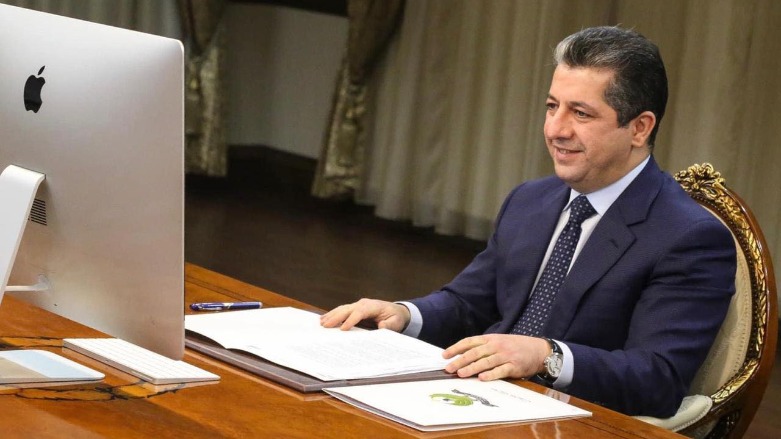PM Barzani: Kurdistan Region encourages foreign investment and is working with US government and US Chamber of Commerce

ERBIL (Kurdistan 24) – The Prime Minister of the Kurdistan Regional Government (KRG), Masrour Barzani, strongly encouraged US companies to invest in the Kurdistan Region, as he repeatedly stressed that the KRG encourages and supports foreign investment in the Kurdistan Region of Iraq.
Barzani’s statement came during a virtual economic conference on Monday, sponsored by the US Chamber of Commerce, which aimed at encouraging foreign investment in the Kurdistan Region, particularly from US companies.
“My government has begun development across a wide range of areas and sectors,” he said, and “we are working hard to diversify our economy, through the privatization of significant parts of the agriculture and electricity sectors.”
“We are also making it easier to do business by digitizing important aspects of our government,” he continued, noting his cabinet’s series of far-reaching reforms in several economic sectors.
Barzani became Prime Minister of the Kurdistan Region in July 2019 and among his top priorities has been modernizing and diversifying the Kurdish economy.
Thus, he stressed the KRG’s efforts “to streamline the business of doing business,” by modernizing the banking sector and introducing best-practice technologies, describing that as an area in which “I particularly welcome US expertise.”
Barzani also detailed developments in the energy sector, stating, “I am pleased to announce the recent progress that Secretary (of Energy) Dan Brouillette and I made in this sector to unlock greater opportunities for US investors.”
“We welcome international investment in all sectors of our economy, from health care and education to green energy, manufacturing, and agriculture,” he continued. “My government is also working to reduce red tape to ensure that foreign investors are able to complete necessary procedures more quickly and more easily—from company registration to visa regulations and permits.”
Barzani also explained the role of the KRG’s Board of Investment in keeping investors up-to-date on local regulations, enabling them to receive licenses rapidly. “During this cabinet, more than 70 licenses have been awarded with an investment value of almost two billion US dollars,” he said.
He also described the progress that his cabinet has made in reforming government: clamping down on corruption; delivering public service more efficiently; and extensive digitalization of government operations.
“We are also working hard to ensure that our relationship with the federal government in Baghdad is fair and delivers real outcomes,” Barzani said, as he described the issues outstanding between Erbil and Baghdad.
“I am committed to resolving them, including the KRG’s share of the federal budget, ensuring that all rights and duties are respected and acknowledged in line with the constitution,” he added.
“Kurdistan is the ideal gateway for American investors into Iraq—and the rest of the Middle East,” Barzani said, pointing to its young, dynamic, and highly educated workforce.
They are “digitally literate and innovative, as English is widely spoken, in addition to Kurdish and Arabic,” he stated.
Barzani reiterated that his goal is not only to give the Kurdish people jobs, but to provide the necessary tools to “unlock their entrepreneurial spirits.”
And he stressed that the Kurdistan Region is a safe haven in an unstable region, while “we are committed to religious, ethnic, and cultural diversity.”
“Like the United States, we believe that ensuring individual freedom is essential to political and economic success,” he affirmed.
Several sectors in the Kurdistan Region are ripe for foreign investment, starting with agriculture, he noted. “Kurdistan is one of the first places in human history to develop agriculture,” and the KRG’s goal in this sector is to reach self-sufficiency over the next five years, with the ability to export to Iraq and beyond its borders.
He stated that despite the COVID-19 pandemic, the Kurdistan Region remains open for business and has seen significant developments in road and other major infrastructural projects through a public-private partnership.
He expressed his wishes that the coming year, 2021, will produce the promised COVID-19 vaccines, so “we can meet in person and engage in face-to-face business dealings.”
Then, “you will be able to see for yourselves the changes that are being brought to Kurdistan by this government and our people.”
Barzani concluded by expressing the hope that “this conference will bring US and Kurdish businesses closer together and help identify opportunities across the entire range of our economy to help realize the vast potential of the Kurdistan Region.”
New investors, he suggested, would do well to look to those who have already invested in the region and hear directly from them about the substantial potential for success and growth.
Editing by Laurie Mylroie
